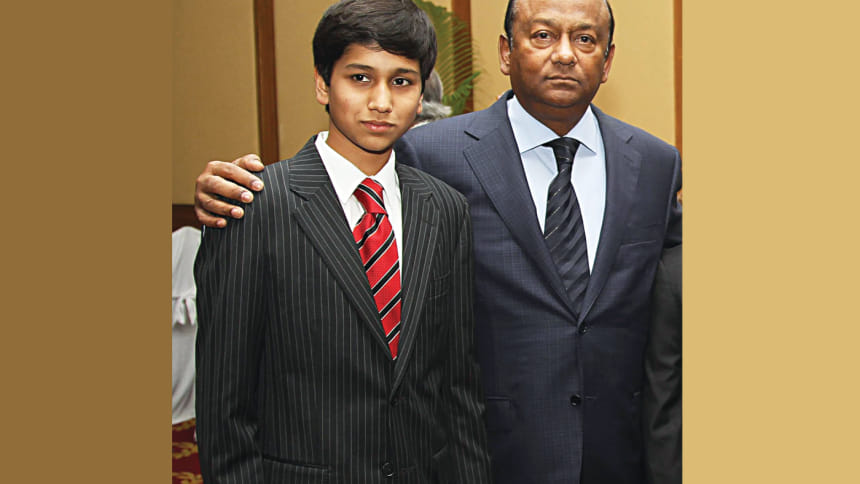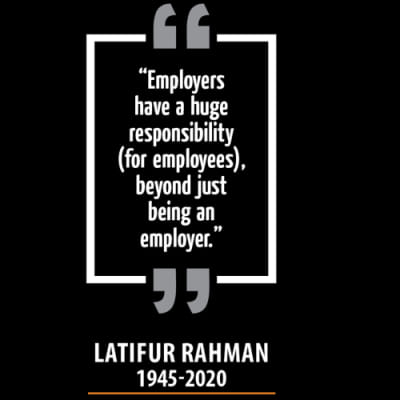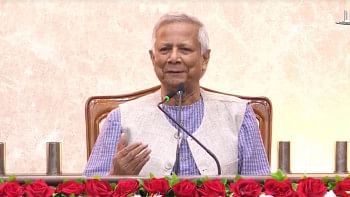LIGHT of ethical business goes out


He was a paragon of business ethics.
His business acumen, his leadership and integrity, his advocacy for high standards, and his vision to serve the people made him a role model for the new generation of entrepreneurs and encouraged them to make meaningful contributions to the society.
A respected figure in the global business community and a recipient of many prestigious global awards, Latifur Rahman single-handedly built one of the biggest business conglomerates in the country with his hard work, perseverance, and entrepreneurial skills.
And truly he reached the pinnacle of success by setting up numerous prosperous new enterprises. Simultaneously he maintained a vocal stance against unethical business practices and never entertained any unfair means, not even in the early seventies when the country's atmosphere was not congenial to business.
Soft-spoken and humble, this visionary, who with his elegant personality would light up people around him, passed away in his sleep around 11:00am yesterday at his paternal home in Cumilla. He had been suffering from lung-related illness for a long time.
He was 75.
The founder chairman and CEO of Transcom Group, a well-known and highly respected business house in the country, left behind an unmatched legacy of entrepreneurship and industrialisation.
He was the founding director of Mediaworld, the owning company of The Daily Star, and chairman of Mediastar, the owning company of Prothom Alo -- both leading English and Bangla newspapers of the country.
His demise prompted a number of cabinet members to express profound shock and sorrow. As the news of his death spread, condolences and memories of working with the corporate giant poured in also from his friends and colleagues.
Latifur Rahman was married to Shahnaz Rahman. Together they have three daughters Simeen Hossain, Shahzreh Huq, (late) Shazneen Rahman, and a son, Arshad Waliur Rahman.
His passing coincided with the death anniversary of his grandson Faraaz Ayaaz Hossain. Faraaz, a student of Emory University in Atlanta, US, was brutally killed by terrorists during the July 1 terror attack at the Holey Artisan Bakery in Gulshan in 2016.
Born in Jalpaiguri on August 28, 1945, Latifur lived at the capital's Gendaria.
He began his education at St Francis School and then went to St Edmund's School, Shillong, in 1956. He also studied at St Xavier's College in Calcutta (now Kolkata).
After coming to Dhaka, he started his career as a trainee at his family-owned jute mills -- W Rahman Jute Mills -- in Chandpur in 1966. It was the first jute mill owned by a Bangalee in the erstwhile Pakistan. He worked there as an executive until 1971.
But when the government nationalised industries in 1972, Latifur found himself in a very difficult situation.
The family also owned some tea estates in north-eastern Bangladesh. But after the independence of Bangladesh, the price of the produce was less than the production costs.
But he did not give up hope.
The same year, Latifur came across a Swiss company and started a trading business.
There was no looking back after that.
As his business activities branched out into different sectors, he established Transcom Group in 1981. It is now one of the country's largest conglomerates, with operations in the areas of manufacturing, pharmaceuticals, electronics, beverages, media, consumer, food, and insurance.
The group has an annual turnover of more than $600 million, employing over 14,000 people. Its pharmaceutical products are exported to 27 countries.
Transcom Group has won multiple global accolades for its excellence and ethically strong business practices.
Latifur's enterprises boast immaculate tax and bank loan records and are also among the highest-payers of corporate tax, VAT, and import duties in a country where many top companies are wilful defaulters.
In 2012, he won the prestigious Oslo Business for Peace Award for keeping commitment to social responsibility and ethical values. The award is considered the most celebrated recognition in the business world, and an independent committee of Nobel Prize winners in peace and economics chooses the award's recipients.
The recognition put Latifur in the group of exceptional business personalities like Ratan Tata, chairman of India's Tata Group, who got the award in 2010, and Jeffrey R Immelt, CEO of the US's General Electric, who received it in 2009.
He always believed in providing employees with appropriate compensation, training, position, and more importantly "empowerment".
"Respect for the individual is of utmost importance. People may make mistakes, and of course they need to be taken to task for that, if required, but upholding an employee's self-esteem is vital. Everyone deserves to be treated with respect," he once said.
He used to reject a popular perception that there are no qualified people in Bangladesh.
"We are as good as any professionals in the world. We have quality people. It is a question of providing them the right opportunities, atmosphere, and guidance," he said.
He urged young students not to be disheartened in times of difficulties as adversity is a part of natural progression.
"You should continue fighting. You should live up to your values, courage, and character."
Latifur was a member of the executive board of ICC-Paris, vice-president of ICC-Bangladesh and member of Brac's governing body. He was a member of Bangladesh Better Business Forum and the Advisory Committee on World Trade Organization (WTO).
He was also president of the Metropolitan Chamber of Commerce and Industry, Dhaka, for seven terms and of Bangladesh Employers' Federation. Besides, he was the chairman of the Bangladesh government's Trade Body Reforms Committee.
He was awarded Business Executive of the Year 2001 by the American Chamber of Commerce in Bangladesh.
He was also honoured with the "SAARC Outstanding Leader" award and Lifetime Achievement Award which was presented by the UK Bangladesh Catalysts of Commerce and Industry for setting a "rare example" of doing business by upholding moral values while also fulfilling the organisation's social responsibilities.
Latifur served in many important national bodies in various capacities, including the president of Bangladesh Employers' Federation (BEF) for two terms and member of the Executive Committee of Federation of Bangladesh Chambers of Commerce & Industry (FBBCI), Bangladesh Jute Mills Association and Bangladesh Tea Association.
Besides, he was the member of the Executive Board of Bangladesh Bank and was closely involved in fiscal and trade policy making bodies of the government as chairman, Trade-body Reforms Committee and member, Advisory Committee on WTO.
He was re-elected as a member of the Executive Board of the Paris-based ICC for a second three-year term from July 2017.
The business icon believed that Bangladesh has an extremely bright future on the global stage and that there are huge opportunities for entrepreneurs in the country.
"There are ideas all around us. So, young entrepreneurs will have to keep their eyes open and work on them [ideas] to become successful," he once said.

 For all latest news, follow The Daily Star's Google News channel.
For all latest news, follow The Daily Star's Google News channel. 



Comments